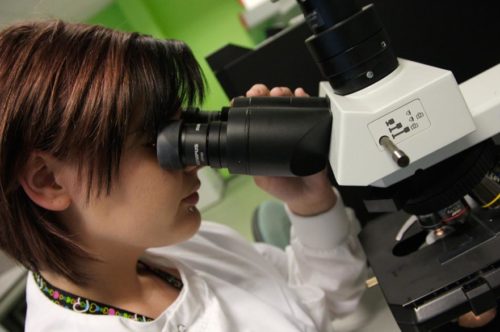Overview
Our BSc Biomedical Science (including foundation year) will be suitable for you if your academic qualifications do not yet meet our entrance requirements for the three-year version of this course and you want a programme that increases your subject knowledge as well as improves your academic skills to support your academic performance.
This four-year course includes a foundation year (Year Zero), followed by a further three years of study. During your Year Zero, you study three academic subjects relevant to your chosen course as well as a compulsory academic skills module, with additional English language for non-English speakers.
After successful completion of Year Zero in our Essex Pathways Department, you progress to complete your course with our School of Life Sciences. On our BSc Biomedical Science course, you will explore the causes and diagnosis of diseases and the effectiveness of the medicines that cure them. You apply the concepts of biochemistry and cell biology to the study of health and disease in the human body. Our multidisciplinary approach means you learn skills that are at the forefront of advanced in medical research.
As one of the largest schools at our University, we offer a lively, friendly and supportive environment with research-led study and high-quality teaching at its heart. You will learn modern lab techniques, take part in specialist field-trips, and play your own part in adding to the ever-growing knowledge within biomedical science.
Visit our biomedical science subject page for more information and content.
Our expert staff
Two-thirds of our research is rated as “world-leading” or “internationally excellent” (REF 2014), and you learn from and work alongside our expert staff.
Our research covers a wide spectrum of biology – from the cell right through to communities and ecosystems. Key academic staff for this course includes Dr Selwa Alsam, the ‚Champion of Biomedical Science in East Anglia‚, who is researching hospital-related infections and human microbial diseases including MRSA, wound infections and infection control.
The University of Essex has a Women’s Network to support female staff and students, and our School was awarded the Athena Swan Silver Award in October 2020, which reflects the work carried out by staff in our School to continue to improve equality, including a mentorship scheme, support for postdoctoral research staff, and financial help towards childcare costs for academics who wish to attend conferences.
Specialist facilities
By studying within our Essex Pathways Department for your foundation year, you will have access to all of the facilities that the University of Essex has to offer, as well as those provided by our department to support you:
- We provide computer labs for internet research; classrooms with access to PowerPoint facilities for student presentations; AV facilities for teaching and access to web-based learning materials
- Our new Student Services Hub will support you and provide information for all your needs as a student
- Our social space is stocked with magazines and newspaper, and provides an informal setting to meet your lecturers, tutors and friends
Recent spending by our University has allowed for major refurbishment and expansion of our School of Life Sciences facilities, including:
- Work in an open and friendly department, with shared staff-student social spaces
- Conduct your final-year research alongside academics and PhD students in shared labs
- State-of-the-art research facilities, from cell imaging systems, to CO2 incubators, to underwater video cameras
- Receive training in your first year on using the Oxford Nanopore MinION, a portable handheld device that can sequence genomes in real time
- Teaching facilities including new undergraduate laboratories
Your future
You graduate ready to move into a wide variety of industrial and public-sector environments, from the NHS to pharmaceuticals, research, health and safety and teaching.
Our students have gone on to work in a number of laboratory-based roles in the pharmaceutical and biotechnology industries, and in hospitals, clinics and healthcare companies. Others have gone on to work in sales, publishing and management, while other still have chosen to enhance their career opportunities by studying for MSc of PhD degrees.
Other recent graduate destinations include:
- Andrologist
- Perfusionist
- Studying medicine
- Studying MSc or PhD
- Working in NHS Hospitals at Cambridge, Chelmsford, Colchester, PHE in Colindale, Basildon, London, Bury St Edmunds, Kent, Ipswich, Norwich, Peterborough and Romford
We also work with our University’s Student Development Team to help you find out about further work experience, internships, placements, and voluntary opportunities.
For more information on careers in Biochemistry and Biomedicine, visit the website of the Biochemical Society and the Institute of Biomedical Science.
Why we’re great
- Gain fast-track career progression within the NHS.
- Take advantage of our brand new biomedical science facilities in our STEM Centre at our Colchester Campus.
- We emphasise employability and have strong links with industry, government and NGOs.
Structure
Course structure
We offer a flexible course structure with a mixture of core/compulsory modules, and optional modules chosen from lists.
Our research-led teaching is continually evolving to address the latest challenges and breakthroughs in the field, therefore all modules listed as subject to change. To view the compulsory modules and full list of optional modules currently on offer, please view the programme specification via the link below.
Teaching and learning disclaimer
Following the impact of the pandemic, we made changes to our teaching and assessment to ensure our current students could continue with their studies uninterrupted and safely. These changes included courses being taught through blended delivery, normally including some face-to-face teaching, online provision, or a combination of both across the year.
The teaching and assessment methods listed show what is currently approved for 2022 entry; changes may be necessary if, by the beginning of this course, we need to adapt the way we’re delivering them due to the external environment, and to allow you to continue to receive the best education possible safely and seamlessly.
Placement
Please note, vaccinations are required if students undertake an NHS placement.




















